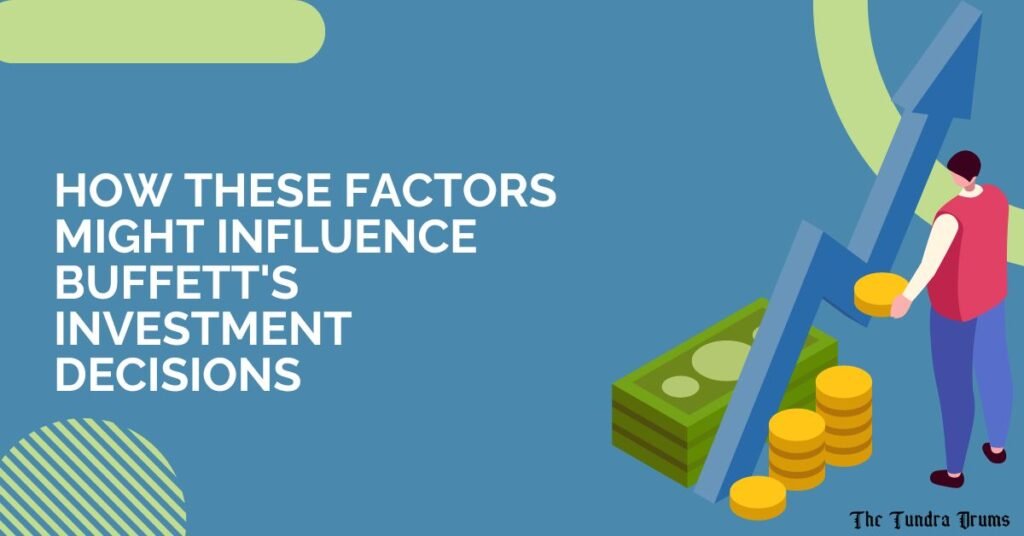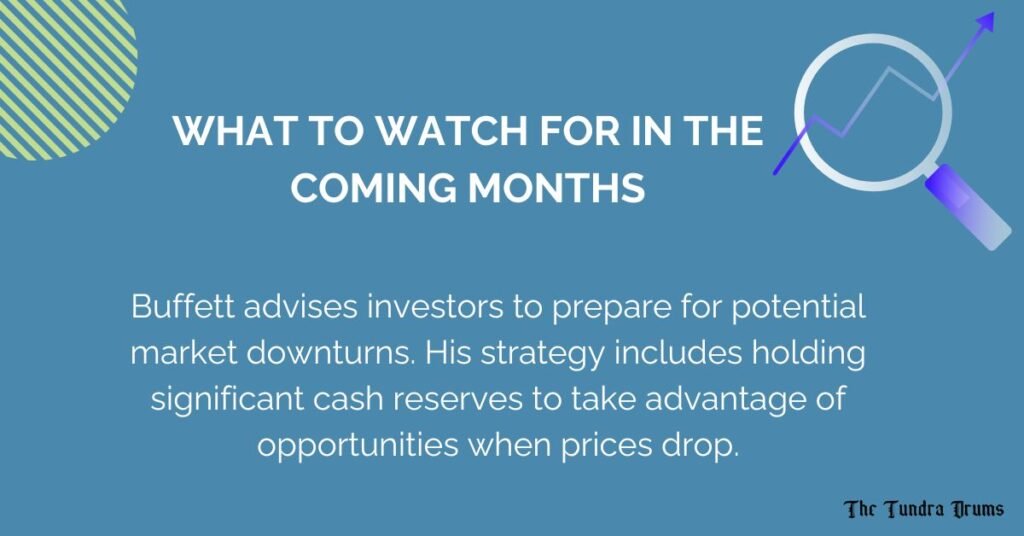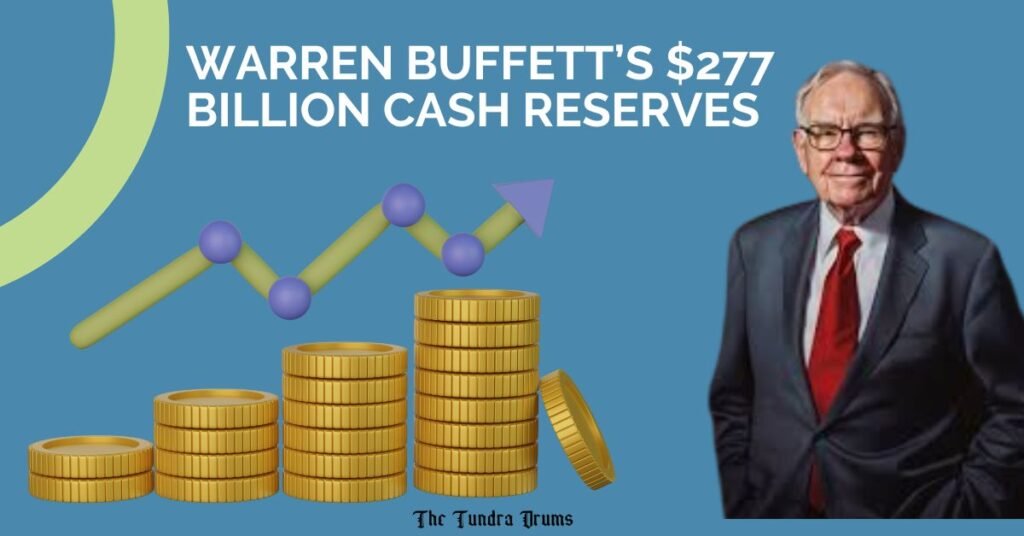Berkshire Hathaway, under the leadership of Warren Buffett, continues to be a beacon of financial prowess and strategic acumen. In its Q2 earnings report for 2024, the conglomerate posted strong results, reflecting its diverse portfolio of investments and businesses. A key highlight from the report is the astonishing Warren Buffett’s $277 billion cash reserves, a figure that has garnered significant attention in the financial world.
The Q2 earnings report revealed that Berkshire Hathaway’s operating earnings reached $10.04 billion, a significant increase from the previous year. This cash pile, which has grown steadily over the past few years, has sparked discussions about Buffett’s strategic intentions—whether it represents a cautious approach amid economic uncertainty or a strategic move to capitalize on future opportunities. Warren Buffet’s money growing strategies have inspired countless investors to follow in his footsteps.
Strategic Move for Future Investments or Cautious Approach Amid Economic Uncertainties
Many people wonder, did Warren Buffet get rich from just stocks, or were there other factors at play in his financial success? Yes, Warren Buffet did get rich from just stocks, but his success was also driven by his long-term investment strategy, the power of compound interest, and his ability to identify undervalued companies with strong growth potential.
Additionally, his investments in entire companies through Berkshire Hathaway further contributed to his immense wealth. Warren Buffett’s Berkshire Hathaway has reported a significant increase in its cash reserves, reaching a record $277 billion as of June 30, 2024.
This increase is attributed to a strategic reduction in stock holdings, particularly a nearly 50% cut in its stake in Apple Inc., alongside a substantial selling spree that saw the company divest $75.5 billion in stocks during the second quarter alone. He is renowned for his patience and strategic foresight. Historically, he has advocated for holding substantial cash reserves to capitalize on market downturns or seizing opportunities when valuations become attractive.
Berkshire Hathaway cash reserves allow the flexibility to make substantial acquisitions or investments quickly when the right opportunities arise. This strategy is particularly relevant in times of economic volatility, where Buffett can leverage the cash to secure favorable deals, potentially in distressed assets or businesses.
Overview of Economic Uncertainties Affecting Global Markets
On the other hand, the growing cash reserve might also reflect a cautious stance in response to economic uncertainties. The global economy faces several challenges, including inflationary pressures, rising interest rates, geopolitical tensions, and potential recessions in major economies. These factors create a complex and uncertain investment landscape, where even seasoned investors like Buffett may prefer to hold onto cash rather than deploy it into an unpredictable market.
1. Inflationary Pressures
Inflation has been a significant concern across global markets, driven by factors such as supply chain disruptions, increased demand post-pandemic, and rising energy costs. Central banks, particularly the Federal Reserve in the U.S., have responded with interest rate hikes aimed at curbing inflation. However, these measures have also led to increased borrowing costs, potentially slowing down economic growth.
2. Potential Recession Risks
The aggressive tightening of monetary policy by central banks to combat inflation has raised concerns about triggering recessions in major economies. The U.S., Europe, and other regions are facing the possibility of economic downturns, with indicators such as declining consumer confidence, reduced corporate earnings, and sluggish GDP growth signaling potential recessions. The uncertainty surrounding the timing and severity of these recessions adds another layer of complexity to the investment environment.
3. Corporate Tax Changes
Changes in corporate tax policies, particularly in the U.S., have also contributed to economic uncertainty. Proposals for higher corporate taxes to fund government spending initiatives could impact company profitability and investment decisions. For large multinational corporations like those in Berkshire Hathaway’s portfolio, changes in tax policies across different jurisdictions could lead to increased costs and affect their overall financial performance.
How These Factors Might Influence Buffett’s Investment Decisions

Inflation and Recession Risks
Buffett’s actions are perceived as a defensive strategy in response to concerns about high stock market valuations and broader economic uncertainty. The recent selloff in the markets, including a 3% drop in the S&P 500, has heightened fears of potential economic downturns, prompting Buffett to maintain a robust cash position for future investments when opportunities arise. His investment philosophy is deeply rooted in long-term value creation.
In the current environment of high inflation and potential recession risks, Buffett is likely to be more selective in deploying capital. Inflation erodes purchasing power, and in a high-inflation environment, companies with strong pricing power, low capital intensity, and stable cash flows become more attractive to Buffett. He may seek to invest in businesses that can maintain their profitability even in the face of rising costs.
At the same time, the risk of a recession may lead Buffett to favor companies with resilient business models that can withstand economic downturns. Industries such as utilities, consumer staples, and healthcare, which provide essential goods and services, are typically less sensitive to economic cycles and may be of particular interest to Buffett during uncertain times.
Corporate Tax Changes
Buffett is known for his meticulous attention to detail, including tax implications of investments. Potential increases in corporate taxes could influence Buffett to focus on companies with efficient tax structures or those that can absorb higher tax burdens without significantly impacting their profitability. Additionally, Buffett may consider the geographic diversification of Berkshire Hathaway’s investments to mitigate the impact of tax changes in any single jurisdiction.
Strategic Patience
Given these economic uncertainties, Warren Buffett’s cash reserve patience comes into play. He might prefer to hold onto the large cash reserve until clearer economic trends emerge. This approach allows him to avoid rushing into investments in a volatile market and to potentially take advantage of distressed asset prices if a recession materializes. Buffett’s cautious approach ensures that Berkshire Hathaway remains well-positioned to capitalize on future opportunities while mitigating the risks associated with current economic challenges.
The combination of inflation, potential recession risks, and corporate tax changes are likely influencing Buffett to maintain a significant cash reserve. This strategy not only provides a buffer against economic volatility but also positions Berkshire Hathaway to make opportunistic investments when market conditions become more favorable.
Market and Financial Analysts’ Response to the Q2 Earnings Report and Large Cash Reserve
The market’s reaction to Berkshire Hathaway’s Q2 earnings report and the revelation of its cash reserve has been mixed. On one hand, the strong operating earnings and the stability of Berkshire’s diverse portfolio were seen as positive indicators of the company’s resilience in a challenging economic environment. While examining Warren Buffett’s strategic approach to holding $277 billion in cash, it’s interesting to consider the historical decisions within his family, such as Warren Buffett’s son’s decision to sell $90K in Berkshire Hathaway shares 47 years ago and their current value. Investors generally view Berkshire Hathaway as a haven, especially during times of economic uncertainty, and the large cash reserve has reinforced this perception.
However, some market participants expressed concerns about the growing cash pile, questioning whether Berkshire Hathaway is missing out on investment opportunities by holding so much cash instead of deploying it into the market. The cash reserve has grown steadily over the past few years, leading to speculation about Buffett’s cautious stance and whether this reflects a lack of attractive investment opportunities or a deliberate strategy to wait for better valuations.
Financial Analysts’ Response
Financial analysts have offered a range of perspectives on the Q2 earnings report and the substantial cash reserve:
- Positive Outlook on Cash Reserve: Many analysts view the large cash reserve as a strategic advantage, particularly in the current economic climate. They argue that Buffett’s conservative approach is prudent given the uncertainties surrounding inflation, potential recessions, and volatile markets. Analysts have highlighted that Berkshire Hathaway’s liquidity positions the company well to capitalize on future market downturns, allowing it to make acquisitions or significant investments at more favorable prices.
- Concerns About Underutilization of Capital: Some analysts have expressed concerns that the large cash reserve may indicate a lack of confidence in the current market or a dearth of viable investment opportunities. These analysts suggest that by holding so much cash, Berkshire Hathaway may be missing out on potential returns, especially in a market where other companies are actively pursuing growth through investments, mergers, and acquisitions.
- Mixed Views on Investment Strategy: There is a debate among analysts about whether Berkshire’s cash hoarding is a sign of strategic patience or a cautious response to economic risks. Some believe that Buffett is waiting for a major market correction or a recession to deploy the cash reserve aggressively, in line with his historical strategy of investing during market downturns. Others speculate that the cash buildup could reflect broader concerns about the sustainability of current market valuations and economic conditions.
- Buffett’s Influence on Market Sentiment: Analysts also recognize that Buffett’s decisions have a significant impact on market sentiment. His cautious approach might influence other investors to adopt a more conservative stance, particularly in times of heightened economic uncertainty. On the flip side, any significant investment or acquisition by Berkshire Hathaway in the coming months could be seen as a strong vote of confidence in specific sectors or the broader market, potentially driving market optimism.
Sectors or Industries Where Buffett Might Deploy the Cash Reserve
While Buffett has traditionally been cautious about the technology sector, his investment in Apple has proven to be one of Berkshire Hathaway’s most successful. After the reduction, Berkshire still holds about 400 million shares of Apple, valued at approximately $84.2 billion.
The technology sector continues to be a major driver of global economic growth, and there are opportunities in areas like cloud computing, cybersecurity, and digital transformation.
Buffett might target established tech companies with strong cash flows, robust business models, and significant competitive advantages. However, he would likely avoid highly speculative tech stocks and focus on those with proven track records.
Recent Changes in Berkshire’s Portfolio
Berkshire Hathaway’s investment portfolio is closely watched by analysts and investors alike, as it reflects Buffett’s views on market opportunities and risks. In recent quarters, there have been notable changes in the portfolio, particularly the reduction in stakes in two of its significant holdings: Apple and Bank of America.
Reduction in Apple Stake
Apple has been one of Berkshire Hathaway’s most successful investments, and it remains the largest holding in the portfolio. However, in recent quarters, Berkshire has trimmed its stake in Apple. This move has sparked considerable discussion among analysts, as Buffett has previously expressed strong confidence in Apple’s long-term prospects, praising its ecosystem, brand loyalty, and consistent revenue streams.
The reduction in Apple’s stake could be seen as a strategy to lock in gains after a significant appreciation in the stock’s value. With Apple’s stock having risen substantially over the past few years, Buffett might be rebalancing the portfolio to reduce exposure to a single company. Despite the reduction, Apple still represents a substantial portion of Berkshire’s equity holdings, indicating continued confidence in the company’s future.
Reduction in Bank of America Stake
Bank of America has been another cornerstone of Berkshire Hathaway’s portfolio, particularly after the financial crisis, when Buffett made a significant investment in the bank. Over the years, this investment has paid off handsomely, as Bank of America has strengthened its balance sheet and improved profitability.
However, like with Apple, Berkshire has recently reduced its stake in Bank of America. This decision could be influenced by several factors, including concerns about the broader financial sector’s exposure to economic uncertainties, such as rising interest rates, regulatory changes, and potential loan defaults in a slowing economy. By trimming its position, Berkshire may be mitigating some of the risks associated with the financial sector while still maintaining a meaningful investment in a major U.S. bank.
Insights for Investors: What to Watch for in the Coming Months

Investors often ask, does Warren Buffett do fundamental analysis or technical analysis when making his investment decisions? Buffett primarily uses fundamental analysis rather than technical analysis. He focuses on the intrinsic value of companies, examining financial statements, management quality, and long-term growth potential to make his investment decisions.
As Berkshire Hathaway navigates the current economic landscape with its significant cash reserves and strategic portfolio adjustments, investors should keep an eye on a few key factors that might hint at Warren’s next moves. Many investors are curious to know, what 5 funds did Warren Buffett recommend for a solid long-term investment strategy? has recommended low-cost index funds as the best investment for most people. Specifically, he often suggests the S&P 500 index fund as a top choice. While he hasn’t explicitly listed five specific funds, his general advice is to invest in diversified, low-cost index funds that track the overall market.
Here’s what to watch for in the coming months:
- Cash Deployment: The biggest question is how and when Buffett will use Berkshire’s $277 billion cash reserve. Investors should look for signs of market corrections or downturns, as Buffett may seize the opportunity to make significant investments or acquisitions at lower prices.
- Portfolio Changes: Recent reductions in stakes like Apple and Bank of America suggest Buffett is managing risks and keeping the portfolio balanced. Watch for further sales of large holdings or new investments in emerging sectors such as renewable energy, fintech, or healthcare technology.
- Buffett’s Commentary: Buffett’s public statements and annual letters often offer clues about his views on the economy and markets. Pay attention to his thoughts on inflation, interest rates, and potential recessions, as well as any updates to his investment philosophy.
- Earnings Reports: Berkshire’s quarterly earnings provide insights into its operating businesses and investment performance. Look at trends in operating earnings and any stock buybacks, which might indicate Buffett’s confidence in the company’s value.
- Market Sentiment: Buffett’s moves often reflect broader market trends. It’s helpful to see how other large investors react to his strategies and how Berkshire’s approach compares to that of its peers.
Final Thoughts
Billionaire Warren Buffett’s approach to investing reflects a deep-rooted belief in the resilience of the U.S. economy and the power of patience. His substantial cash reserve is not just a cautious hedge against current uncertainties but also a strategic tool, allowing him to act decisively when the right opportunities arise. Buffett’s refusal to overpay, even for the most reliable businesses, underscores his commitment to value investing—a philosophy that has guided Berkshire Hathaway to remarkable success over the decades. As he continues to navigate an unpredictable market landscape, Buffett’s blend of cautious optimism and disciplined strategy remains a powerful lesson for investors worldwide.











